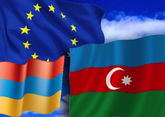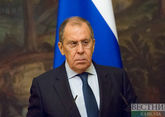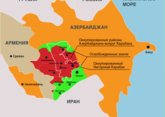The 2016 April battles for Karabakh contributed to the Karabakh clan's collapse in Armenia and removal of Serzh Sargsyan from power, journalist Silvia Steber, specializing in the post-Soviet space, said in an interview with political scientist Nadja Douglas in the episode of the podcast dedicated to Armenia's 'Velvet Revolution,' available on the website of the Berlin-based Centre for East European and International Studies (ZOIS).
Speaking about the results and prospects of the 'velvet revolution', Nadia Douglas expressed confidence that Yerevan’s foreign policy will not undergo changes due to the change of power. "Pashinyan will most likely continue the traditional policy towards Russia. Armenia will continue its constructive cooperation with the EU, but I do not think that steps will be taken in the foreseeable future towards concluding an associative agreement with the EU," she said, explaining that the Armenian society seeks to equally cooperate with both the EEU and the EU.
The political scientist stressed that it is of fundamental importance for the Pashinyan government to achieve normalization of relations with Azerbaijan. "Public opinion polls show that after the country's socio-economic problems the Armenian population names the Nagorno-Karabakh conflict as the second most acute problem. Unlike other regional conflicts, for example, in Georgia or Moldova, the Nagorno-Karabakh conflict is not frozen - and all citizens of Armenia understand it," the ZOIS research associate noted.
Silvia Steber dwelled on the connection between the 2016 April battles for Karabakh and the 'velvet revolution' in April 2018. "In 2016, Azerbaijan demonstrated that it is able to liberate the occupied territories. There was great dissatisfaction in Armenia in relation to its own government, which was accused of not being able to keep the territories and prevent the supply of Russian weapons to Azerbaijan. Particular anger is focused on corruption - the soldiers were not well secured to fight effectively. These events were very important in losing confidence in the government and increasing public dissatisfaction," she pointed out.
According to the expert, today Pashinyan's space for political maneuver in the Nagorno-Karabakh issue is limited, so he speaks from even more tough positions than his predecessors from the Republican Party, demanding to involve "representatives" of the unrecognized "NKR" in the negotiations.
Touching upon Pashinyan’s fulfillment of his election promises, Silvia Steber noted that prior to the early parliamentary election, it was obstructed by members of the Republican Party of Armenia. A typical example is the failed adoption of a new electoral code. In the fight against oligarchs, despite a number of high-profile arrests, some old tendencies are preserved: the government is making political compromises with major businessmen, which contradict the Pashinian government's initial promises.
The expert focused on another aspect: after the arrests and criminal cases against oligarchs and large businesses, for example, the Spayka company, ordinary employees of these companies began to realize that they can lose their jobs. As a result, they stage protests against the government's actions.
Silvia Steber stressed that it challenges the Armenian government to create alternatives for citizens losing their jobs. But the question is what reforms can provide these alternatives. Today, attention is focused on neoliberal reforms, which resembles the example of Georgia, where little has been done in the social sphere. In the case of Armenia, social protection of the population is especially important, since this sector practically does not exist in the country, but people need to be strongly supported.
The expert also noted the criticism of Pashinyan’s anti-misinformation methods, recalling his instructions to the Armenian National Security Service to investigate and prosecute fake news distributors.










